Edie Melson's Blog, page 226
September 11, 2019
Write Where God Leads You

by Julie Lavender @JLavenderWrites
Why did I say yes to this assignment, I thought as I drove to the high school in my hometown. Armed with notebook, several pens, and my camera, I trudged into the auditorium. Already on stage sat a dozen or more fourth through eighth grade youngsters.
Can these kids please not be as smart as the last ones? Two years ago, I’d covered the same event and those darn smart children spelled for hours and hours. Don’t get me wrong—I love kids. I have a Masters in Early Childhood Education, and I homeschooled all four of my own children. I adore kids and academia, but I had a bad attitude about the story.
You see, most of my newspaper bylines result from faith-based stories that I locate on my own. I enjoy sharing God-stories in the newspaper, and I never quibble about the mediocre wages per byline because I think of my work as a ministry.
 As a newspaper stringer, however, I often have the opportunity to cover news-related stories, and I can honestly say that I enjoy ninety-nine percent of those stories, too. Occasionally, I’m tasked with a bit of a yawner, and the year before, three-and-a-half hours of spelling words fell in that category. Towards the end, two young brilliant boys went back and forth for thirty-five rounds before Elikem Gato stumbled on the word “mukhtar,” and Eric Lim was declared the winner.
As a newspaper stringer, however, I often have the opportunity to cover news-related stories, and I can honestly say that I enjoy ninety-nine percent of those stories, too. Occasionally, I’m tasked with a bit of a yawner, and the year before, three-and-a-half hours of spelling words fell in that category. Towards the end, two young brilliant boys went back and forth for thirty-five rounds before Elikem Gato stumbled on the word “mukhtar,” and Eric Lim was declared the winner.
Oh, dear—Elikem’s back, I mumbled quietly and prepared to camp out for the long-haul. I probably also added to my thoughts, “God, please don’t let this go on forever again—I won’t make squat if I’m here all night long.”
A reimbursement of mere pittance seemed fine if I got to talk about God, but a spelling bee that lasted an eternity just didn’t’ seem worth my efforts.
I was lulled into amazement at the kids’ performance, just like last time, with the first pronunciation.
“polymer.”“dollop.”“bevel.”“acknowledgement.”“descendant.”
When “folksiness” tripped up seventh-grader Nicholas Cortes, Elikem Gato correctly spelled “beneath” and “flail” to become the spelling bee champion.
Gathering my journalist’s paraphernalia, I made my way to the winner. I snapped the obligatory trophy shot with his school principal and grabbed cute shots with his family, too. Both parents and two brothers congratulated Elikem and beamed with pride.
All I need is a couple of quotes from the champion, and I’m outta here.
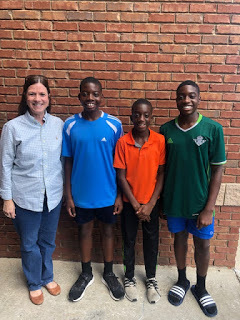 “Elikem, how does it feel to be the county-wide spelling bee champion?”
“Elikem, how does it feel to be the county-wide spelling bee champion?”“Good.”
Well, that was a bust—let me try another one.
“How did you prepare for the spelling bee, Elikem?
“I study a lot with my brothers—in the car, after school, at home. We call out words to each other. We grew up memorizing Bible verses at home, so memorizing words comes a lot easier for us.”
I paused from my writing and made eye contact with the youngster. His dad, a college professor, added in his beautiful Ghana-cadence, “We try to train our kids to live out their faith, to let them know the importance of knowing Jesus and trying to live for him as best as God can help us.”
With a mere pittance of quotes, my article had suddenly become a God-story. I was right where God needed me to be that night after all.
My grin widened almost as much as the trophy-holding champion’s, and I chatted with the family until the maintenance guy turned off the lights in the auditorium as a not-so-subtle hint.
Recognizing that the story had additional potential beyond a newspaper story, I exchanged numbers with Elikem’s mom and told her I’d be in touch.
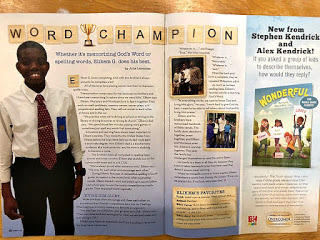 Ordinary kids doing extraordinary things. Jesse Florea’s words during a one-on-one with the Clubhouse Magazine editor at Blue Ridge Mountains Christian Writers Conference the previous year kept coming to me on the drive home.
Ordinary kids doing extraordinary things. Jesse Florea’s words during a one-on-one with the Clubhouse Magazine editor at Blue Ridge Mountains Christian Writers Conference the previous year kept coming to me on the drive home. I met my newspaper deadline, and then shot off a query to Jesse about my new-found champion of words and the Word. In a short time, I had a new assignment—interview the Gatos for a Clubhouse article.
I learned an important lesson that evening—and it wasn’t just the fact that many sixth graders can spell words that I can barely pronounce.
Thank you, God, that you’re the author of every story—even the ones that might not say your name specifically—but I’m especially appreciative of the ones where I get to talk about you. Lead me right where you need me to be so that I can continue to write for you.
TWEETABLES
Write Where God Leads You - @JLavenderWrites on @EdieMelson (Click to Tweet)
Often our writing takes us right where God wants us - insight from @JLavenderWrites on @EdieMelson (Click to Tweet)
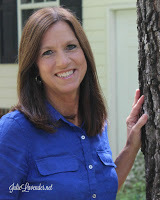 Julie Lavender read newspapers all over the country while her husband served as a Navy entomologist for twenty years. She wrote for the children’s section of the Denver Post for four years. Currently, she reads and writes for her local newspaper, the Statesboro Herald, back in their Georgia hometown and loves the interesting people she meets as a journalist. Julie also writes for GuidepostsPublications, other magazines, a couple of homeschooling blogs, Just18Summers.com, and many compilations. Combining her education degree, love of homeschooling, and joy of celebrating, Julie wrote a devotional entitled, 365 Days of Celebration and Praise, a party planning book called, Creative Sleepovers for Kids, and three teacher resource books for the religious division of Carson-Dellosa. Julie and David are enamored with their four adult children, one son-in-love, and one gorgeous grandson. Keep up with Julie on social media and at her blog at julielavender.blogspot.com.
Julie Lavender read newspapers all over the country while her husband served as a Navy entomologist for twenty years. She wrote for the children’s section of the Denver Post for four years. Currently, she reads and writes for her local newspaper, the Statesboro Herald, back in their Georgia hometown and loves the interesting people she meets as a journalist. Julie also writes for GuidepostsPublications, other magazines, a couple of homeschooling blogs, Just18Summers.com, and many compilations. Combining her education degree, love of homeschooling, and joy of celebrating, Julie wrote a devotional entitled, 365 Days of Celebration and Praise, a party planning book called, Creative Sleepovers for Kids, and three teacher resource books for the religious division of Carson-Dellosa. Julie and David are enamored with their four adult children, one son-in-love, and one gorgeous grandson. Keep up with Julie on social media and at her blog at julielavender.blogspot.com.
Published on September 11, 2019 22:00
September 10, 2019
A Debut Author’s Book Launch Primer
Edie here. Today I'm thrilled to introduce you to an author I met at a recent Christian book show. He writes for my publisher—Bold Vision Books—and I got an advance copy of his book and I LOVE it. I asked if he'd be willing to share some of the insight he's gained here on The Write Conversation and he said yes. So be sure to give him a warm TWC welcome!
 A Debut Author’s Book Launch Primerby David J. Marsh @MarshJDavid
A Debut Author’s Book Launch Primerby David J. Marsh @MarshJDavid
First there’s the book. You’ve proofread your book so many times your latest idea of medieval torture is to read it again. You’ve read an advance reader copy and more changes have been identified—even as you’re sending copies out to influencers and your launch team. A release date has been set and the writerly truth rings true: no one ever finishes a book, they simply stop working on it.Second there’s the promotion. You revved up your social media engine before you finished the book, yet no matter how many followers you have you feel inadequate. You’re producing content at a rate that often makes you feel like a used car salesman. You sense that you’re losing the reader you’ve imagined in a sea of analytics. You only want to know when you can escape all this craziness, go sit in silence, and write.
If this describes you, well done! You’re ready to launch your book.
But how do you do that? Here’s a breakdown that may be helpful as you work to make your book launch uniquely your own.Plan the day. Your goal the day of release will be to boost release day sales. This will be a busy day. You’ll want to be prepared with social media posts, others who will share your content, and giveaways to support your increased online presence.Plan the event. To cap off your virtual presence the day of release, plan to spend some time in person with your readers. Create an evening event the day of release with a reading and more giveaways. This event can be as large or small as you wish, but make it a celebration of the book.Plan the follow-up. In addition to thank you notes to your launch team and volunteers, you’ll want to reach out to local and regional bookstores. Let them know you would be happy to do an in-store event. Be sure to thank your followers for joining you for release day. Invite them to readings. Offer to visit their book clubs. Create a plan to stay in touch with your new readership. Offer them new content on a set schedule that works for you.
Lastly, in the midst of launching your book, write. Ensure you stick to your regular creative regimen. You’re a writer. Enjoy the silence.
TWEETABLESA Debut Author's Book Launch Primer - @MarshJDavid on @EdieMelson (Click to Tweet)
Tips from a debut author on launching a book - @MarshJDavid on @EdieMelson (Click to Tweet)
 David J. Marsh’s debut novel, The Confessions of Adam(Bold Vision Books), will be released on September 10, 2019. Learn more at www.davidjmarsh.com.
David J. Marsh’s debut novel, The Confessions of Adam(Bold Vision Books), will be released on September 10, 2019. Learn more at www.davidjmarsh.com.
Dave grew up steeped in biblical narratives. His mother read to him. His father was a pastor, a student of theology and biblical languages. Dave often asked his father to read aloud the scriptures in their original Hebrew and Greek. While Dave could not understand them, the music of these languages fascinated him.
 In his debut novel, The Confessions of Adam, a re-telling of the universal and dramatic narrative that opens the book of Genesis, he has crafted a richly imagined story of creation and its aftermath.
In his debut novel, The Confessions of Adam, a re-telling of the universal and dramatic narrative that opens the book of Genesis, he has crafted a richly imagined story of creation and its aftermath.
 A Debut Author’s Book Launch Primerby David J. Marsh @MarshJDavid
A Debut Author’s Book Launch Primerby David J. Marsh @MarshJDavidFirst there’s the book. You’ve proofread your book so many times your latest idea of medieval torture is to read it again. You’ve read an advance reader copy and more changes have been identified—even as you’re sending copies out to influencers and your launch team. A release date has been set and the writerly truth rings true: no one ever finishes a book, they simply stop working on it.Second there’s the promotion. You revved up your social media engine before you finished the book, yet no matter how many followers you have you feel inadequate. You’re producing content at a rate that often makes you feel like a used car salesman. You sense that you’re losing the reader you’ve imagined in a sea of analytics. You only want to know when you can escape all this craziness, go sit in silence, and write.
If this describes you, well done! You’re ready to launch your book.
But how do you do that? Here’s a breakdown that may be helpful as you work to make your book launch uniquely your own.Plan the day. Your goal the day of release will be to boost release day sales. This will be a busy day. You’ll want to be prepared with social media posts, others who will share your content, and giveaways to support your increased online presence.Plan the event. To cap off your virtual presence the day of release, plan to spend some time in person with your readers. Create an evening event the day of release with a reading and more giveaways. This event can be as large or small as you wish, but make it a celebration of the book.Plan the follow-up. In addition to thank you notes to your launch team and volunteers, you’ll want to reach out to local and regional bookstores. Let them know you would be happy to do an in-store event. Be sure to thank your followers for joining you for release day. Invite them to readings. Offer to visit their book clubs. Create a plan to stay in touch with your new readership. Offer them new content on a set schedule that works for you.
Lastly, in the midst of launching your book, write. Ensure you stick to your regular creative regimen. You’re a writer. Enjoy the silence.
TWEETABLESA Debut Author's Book Launch Primer - @MarshJDavid on @EdieMelson (Click to Tweet)
Tips from a debut author on launching a book - @MarshJDavid on @EdieMelson (Click to Tweet)
 David J. Marsh’s debut novel, The Confessions of Adam(Bold Vision Books), will be released on September 10, 2019. Learn more at www.davidjmarsh.com.
David J. Marsh’s debut novel, The Confessions of Adam(Bold Vision Books), will be released on September 10, 2019. Learn more at www.davidjmarsh.com. Dave grew up steeped in biblical narratives. His mother read to him. His father was a pastor, a student of theology and biblical languages. Dave often asked his father to read aloud the scriptures in their original Hebrew and Greek. While Dave could not understand them, the music of these languages fascinated him.
 In his debut novel, The Confessions of Adam, a re-telling of the universal and dramatic narrative that opens the book of Genesis, he has crafted a richly imagined story of creation and its aftermath.
In his debut novel, The Confessions of Adam, a re-telling of the universal and dramatic narrative that opens the book of Genesis, he has crafted a richly imagined story of creation and its aftermath.
Published on September 10, 2019 22:00
September 9, 2019
The Value of Writing Friends

by Cindy Sproles @CindyDevoted
Every career has the obvious—work peers. We travel to our offices sharing space with our coworkers eight plus hours a day. These people become our extended family. It’s easy to become part of their lives because we hear their daily struggles, joys, and adventures.Writing is no different. We develop friends who truly understand us. They get our hours shut behind a door working. They understand our sensitivity to situations that we clearly see as a scene developing.
Writers, however, don’t have the pleasure of seeing their peers on a daily basis. Sometimes we only see them yearly at a conference or worse, never seeing them again. Contact happens through social media or email. Sheesh, with technology, we rarely call folks on the phone anymore. We text.
Because we are a somewhat reclusive group, staying connected to our work peers takes effort. Over the years, I’ve made some wonderful friends in the writing world. Some were folks I admired from the rear of the room, hoping someday to call them my friends. Now, I do, but it took effort to develop relationships long distance. I had to make a concerted effort to keep in touch.
Once I began to teach at conferences I saw some of my friends frequently throughout the travel season, but at a conference, we really never have time to sit down and catch up. Sometimes we need personal writing help or prayer. After all, brainstorming is more productive with more than one person. Those relationships help me in massive ways – as friends, confidants, guidance with the craft, advice. Nurturing them is important spiritually and physically.
A writer friend and his sweet wife recently passed by our home. They actually ended up staying the night with us, allowing us time to eat dinner together, laugh, and really talk about our families. There was a little shop talk, but honestly, not a lot. This was simply time to feed the friendship that we maintain via email and social media throughout the year.
It’s important to develop those lasting friendships, especially as writers. Follow these tips to connect and maintain lasting friendships when the miles separate you.Make time to connect: Like anything else, we find time for the things we really want to do. It’s easy to put off making a phone call or sending yet another email, but living in the reclusive world of writing means we MUST. Set aside time weekly to touch base with those peers whom you share a special connection.Skip talking about work: And take time to talk friends and family.Touch base to find out special needs: Prayer is our biggest advocate and from time to time, we need to seek out those who understand us so we can pray together. Prayer not only leads us closer to God, but it leads us closer to one another.Make unexpected phone calls: Not an email. Not a text. A real live phone call. We need that personal connection. People need the human touch to solidify a relationship. A surprise phone call lightens your heart and you never know—sometimes it’s exactly what your peer needs! Social Media banter: Social media is filled with bad news. Friendly banter makes others laugh and it challenges our wit. I have two friends who spend good fun time on social media bantering with me. Fun jabs, puns, and quick wit brings great joy. My friend Michelle and I live to harass our good buddy Bob, and truth be known, he wastes no time to add his return jabs. I recently returned from a conference where a number of writers told me how much they enjoyed my banter with Bob, and Michelle. Not only are we enjoying jabbing one another, but the fun stretches to others. It’s good clean fun.Confidants: There are times we simply need folks who know the trails we travel. They relate to the ups and downs. Frequently touching base with those people keeps you grounded and open to times when sharing your heart is not only relevant but important. Having that person you can trust to share your heart with is vital.
Long distant relationships are tough to maintain, but in the case of the writer, those friendships are valuable. In a world where we sometimes find our characters as our only friends, it’s important to keep the real ones, fresh. Take the time. Make the effort. Develop those relationships. Everyone needs friends. You will see how your writing excels.
TWEETABLESThe Value of #Writing Friends - @CindyDevoted on @EdieMelson (Click to Tweet)
6 Tips to cultivate #writing friends from @CindyDevoted on @EdieMelson (Click to Tweet)
 Cindy K. Sproles is an author, speaker, and conference teacher. She is the cofounder of ChristianDevotions.us and the executive editor of ChristianDevotions.us and InspireaFire.com. Cindy is the managing editor for Straight Street Books and SonRise Devotionals, both imprints of Lighthouse Publishing of the Carolinas. She is an award-winning and best-selling author and the director of the Asheville Christian Writers Conference. Visit Cindy at
www.cindysproles.com
. @cindydevoted
Cindy K. Sproles is an author, speaker, and conference teacher. She is the cofounder of ChristianDevotions.us and the executive editor of ChristianDevotions.us and InspireaFire.com. Cindy is the managing editor for Straight Street Books and SonRise Devotionals, both imprints of Lighthouse Publishing of the Carolinas. She is an award-winning and best-selling author and the director of the Asheville Christian Writers Conference. Visit Cindy at
www.cindysproles.com
. @cindydevoted
Published on September 09, 2019 22:00
September 8, 2019
Tips to Manage a Microphone When You Speak
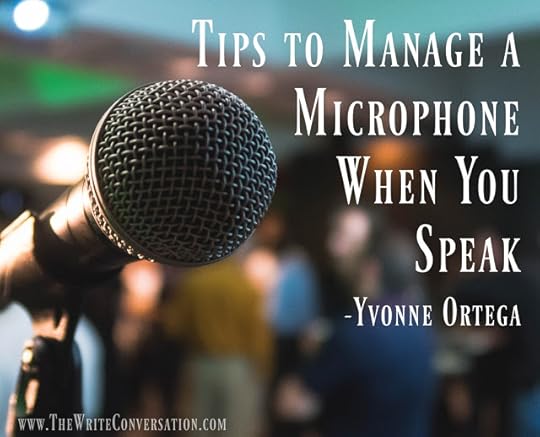
by Yvonne Ortega @YvonneOrtega1
After many laughs and nightmares with a mic, I now tell others that I can manage a microphone without losing my mind. If you and I understand the four types of mic, we can consider the microphone our friend most of the time.
Initially, the microphone proved to be anything but my friend. When I spoke for an event in Roanoke, Virginia, the club had a podium in place. As a petite and vertically challenged woman, I stood before the podium, and it swallowed me. I couldn’t see the audience. If I couldn’t see them, they couldn’t see me either. I asked for a step stool.
The kitchen staff offered their best solution: two rectangular stacking milk crates. I looked at those milk crates and froze. I couldn’t move, or I would tumble and roll off the stage. One of the kitchen staff members assured me the crates were sturdy, but that didn’t ease my concern. Throughout my presentation, I stood locked in place out of fear of falling.
Now when I travel by car, I take a large step stool with me in case I need it. If someone promises to take one, the person might forget or at the last minute, not be able to attend.
The Wired Handheld Microphone My next adventure with a microphone took place at a double, early-bird session at the Greater Philadelphia Christian Writers Conference. I tripped over the cord on the microphone. I laughed at myself and said, “My name is not Grace.” The audience laughed with me.
We laughed harder when I tripped over the cord a second time. Laughter kept me from losing my mind at that event, but I couldn’t claim that the microphone and I were friends yet.
A handheld microphone can be unidirectional or omnidirectional. If it is unidirectional, you must speak directly into it. If you turn your head and continue to talk, the audience will not hear you.
If the handheld mic is omnidirectional, the audience can hear you if you turn right or left and keep speaking. One feature I don’t like is that the omni picks up sound from all directions, even behind me.
The Lavalier MicrophoneBefore one of my TV interviews on Niteline in South Carolina, the technical crew placed a lavalier mic on me and pinned it to the lapel of my jacket. Since I would sit in place and not have wires to trip over, I sighed with relief.
The host said, “I understand the surgeon told you on the phone that the tumor was malignant. How did you react?”
“My heart was pounding so hard I thought it would burst right out of my chest.” As I said that, I tapped my heart, and that lavalier mic picked up the sound. The volume made it sound like my heart was bursting out of my chest. Now I know better, and you can learn from me.
The Headset MicrophoneWhen I spoke at a Women’s Conference in Virginia, the event planner offered me the pastor’s headset microphone. He was more than 6 feet tall and a former football and basketball player — a contrast to my height and size. My early arrival at the event allowed me time to adjust that headset mic to fit as comfortably as possible.
I’ve learned to ask questions about the type of microphone the event planner may have me use. I also ask for pictures of the stage, and where they want me to stand. You can also seek information and pictures ahead of time to manage a microphone and keep you from losing your mind.
If possible, go to a sound shop and try the different types of microphone. The purchase of one may be prohibitive, but at least you’ll have a chance to compare them and learn how to adjust them. You may find a secondhand mic in excellent condition at a bargain price. And yet, because of the venue set up, the event planner may want you to use their microphone.
In closing, the four types of microphone are:The podium micThe wired handheld micThe lavalierThe headset mic
You and I can’t control the setup when the conference staff wants to record the sessions or have us use their equipment. However, we can have a positive attitude, do our best, and pray.
TWEETABLES
Tips to Manage a Microphone When You Speak - @YvonneOrtega1 on @EdieMelson (Click to Tweet)
All speakers need to know about using 4 common types of microphones from @YvonneOrtega1 on @EdieMelson (Click to Tweet)
 Yvonne Ortega walks with a small footprint but leaves a giant imprint in people’s lives. This power-packed package is a professional speaker and the author of the Moving from Broken to Beautiful® Series through cancer, divorce, forgiveness, and loss. Learn more at www.YvonneOrtega.com
Yvonne Ortega walks with a small footprint but leaves a giant imprint in people’s lives. This power-packed package is a professional speaker and the author of the Moving from Broken to Beautiful® Series through cancer, divorce, forgiveness, and loss. Learn more at www.YvonneOrtega.comYvonne speaks with honesty and humor as she shares her life and struggles through presentations that empower women to find peace, power, and purpose through God’s Word.
Yvonne’s background as a licensed professional counselor brings a unique perspective into the heart of women. She’s a speaking and writing coach and the owner of Moving from Broken to Beautiful®, LLC. She belongs to the Advanced Writers and Speakers Association, the Christian Authors Network, the National Speakers Association, and Toastmasters International.
She celebrates life at the beach, where she walks, builds sand castles, blows bubbles, and dances.
Published on September 08, 2019 22:00
September 7, 2019
A Crossroad for My Writing
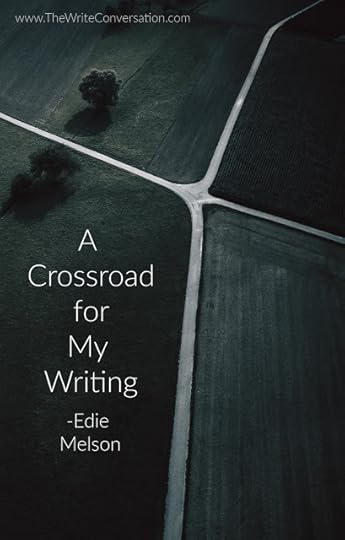
by Edie Melson @EdieMelson
Then Jesus said to his disciples, "If any of you want to be my followers, you must forget about yourself. You must take up your cross and follow me. If you want to save your life, you will destroy it. But if you give up your life for me, you will find it. Matthew 16:24-25
“Take my life and let it be, consecrated all to Thee.”
I heard the words to that old hymn today and found myself transported back in time. Thirteen years ago I hit a crossroads with God. Even back then I knew He’d called me to writing—in my heart I knew—but all around me everything was rejection and heartache. I’d been so thrilled when God called me to write several years earlier. It had just felt . . . right. I mapped out my future. I’d write Bible studies and teach and speak—bringing His Word to His people. I didn’t see anything except the glory.
I railed at God that night—thirteen years ago—shaking a metaphorical fist toward Heaven. “I didn’t ask for this gift of writing—this insane compulsion. Why make me suffer for it.”
Even before the echo of my cry died away I knew it for the lie it was. I remembered that earlier time, when I’d committed myself to God, asking Him to do what He willed with my life. And now I complained because He had? I’d known what that commitment meant and the suffering that would come. How could I have ever thought suffering would be easy or martyrdom pleasant.
But that night at the crossroad I saw a different future. I saw a future where I didn’t second guess God’s plan, but kept my gaze locked tightly on Him. I chose to trust Him and believe that He knew what was best for me, no matter what.
That was the night I died—died to myself and my dream—and began to learn how to live for Him. It was when I learned that to be truly His in every way means giving up my every way.
I didn’t know if God would resurrect me as a writer. Only time held that answer and I had to come to a point where I refused to care. Did I care? Oh I cared, I desperately cared. My dreams, my hopes, my ambitions had been tied to my writing. Now my ambition became the emptying of myself so that I could be filled with God. I learned that didn’t mean “make me look good because I work for You.” Instead it meant, “Make me look any way You choose because I’m totally Yours.”
The Rest of the StoryWhy am I sharing this now? Because with the passing of years has come perspective . . . and peace. So many of you are where I was—second guessing your calling because it doesn’t look like what you thought it would. I urge you to stay the course. Place your confidence in a Worthy God. My life hasn’t taken the path I thought—it’s taken a much better one.
TWEETABLE
A Crossroad for My #Writing - @EdieMelson (Click to Tweet)
Published on September 07, 2019 22:00
September 6, 2019
Writers Facing Discouragement
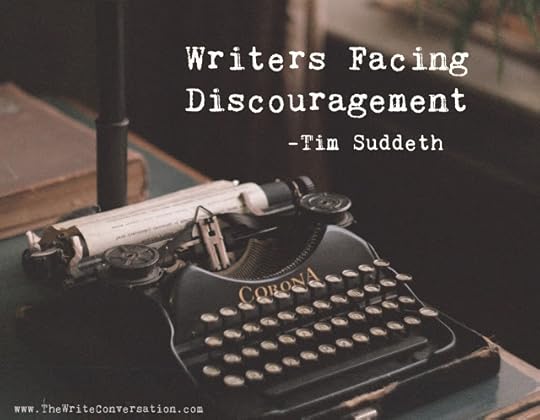
by Tim Suddeth @TimSuddeth
I have been very blessed to be able to attend several writers’ conferences and meetings this year. It’s always fun to meet writers and hear about what their work.
But it is also easy to become intimated. Everyone I met was so smart, so gifted, so successful.And me, not so much.
Oh, I have great ideas. My mind is full of stories if I could just get them on paper. However, when I try to write them down, well, who has the time? And it never comes out as good as it was in my head. Right?
I feel I am speaking to several different times in a person’s writing journey.
To those in the beginning stage, when there is sooo much to learn and everyone else seems to have insights and connections that you don’t.
To those who haven’t had anything published in some time and you don’t know if you still can.
And to those who are finally getting published after so long, but your sales and platform aren’t like what you had hoped. Or like the other writers at your table.
I think I have the attention of lot you.
Now, let me let you onto a little secret. Just those in the click know this. Writing is hard. (Really surprised you there, huh?) Parts of it will get easier with practice and study, but there is always something new lurking just ahead. And when you let how you stack up against someone else be the standard for your success, you are asking for rough waters.
We all know better than to let the accomplishments of others get us discouraged. You can probably end this article with a Bible verse or platitude that’s better than any I can come up with. (See what I did there? Put myself down, didn’t I?) Yet I see a lot of us letting this feeling of inadequacy keep us from writing. Even letting it steal the joy from the writing we do.
I would love to say you can fix this easily by buying my new booklet for just $9.99. But it’s not that easy, is it? There isn’t a onetime fix. Discouragement doesn’t hit once and go away. It’s always lurking nearby, waiting for its next opportunity, for when we feel down or weak.
But the good thing about discouragement (what?) is that it never has the final say. You always have the opportunity to prove it wrong. Get up off the mat. The only way discouragement wins is if you quit. It can hurt and delay, but it can never beat you. Only you get to decide when to quit. And with God, well, I like your chances if you stay in the game.
That doesn’t mean you will outsell or outwrite your friend. That probably isn’t what God called you to do anyway.
I remember when I felt called to go to seminary. Our megachurch had been going through a trial of growth and possibly losing our very charismatic pastor. For a time they left the sanctuary open on Saturday nights for individuals to come and pray. I was sitting in the large, empty auditorium thinking about the pastor and how I could never measure up to him. In the silence, I heard very clearly, I didn’t call you to be another Dr. Brown. I called you to be you.
Not another Max Lucado. Not another Lee Child. Or my friend with the new article or book. But me.
There are times when I know not to argue.
TWEETABLEThoughts on Writers Facing Discouragement - @TimSuddeth on @EdieMelson (Click to Tweet)
 Tim Suddeth is a stay-at-home dad and butler for his wonderful, adult son with autism. He has written numerous blogs posts, short stories, and three novels waiting for publication. He is a frequent attendee at writers’ conferences, including the Blue Ridge Mountain Christian Writers Conference and a member of Word Weavers and ACFW. He lives near Greenville, SC where he shares a house with a bossy Shorky and three too-curious Persians. You can find him on Facebook, Twitter, or at timingreenville.com.
Tim Suddeth is a stay-at-home dad and butler for his wonderful, adult son with autism. He has written numerous blogs posts, short stories, and three novels waiting for publication. He is a frequent attendee at writers’ conferences, including the Blue Ridge Mountain Christian Writers Conference and a member of Word Weavers and ACFW. He lives near Greenville, SC where he shares a house with a bossy Shorky and three too-curious Persians. You can find him on Facebook, Twitter, or at timingreenville.com.
Published on September 06, 2019 22:00
September 5, 2019
Slow Your Story to Move Readers Emotionally
Edie here and I am beyond excited (and having a little fan-girl moment). Today I'm thrilled to share a guest post from one of my publishing heroes,
C.S. Lakin
. I've been a fan of hers for years and cut my writing teeth on her site,
Live, Write, Thrive
. This year she was part of the faculty at the Blue Ridge Mountains Christian Writers Conference and I got to meet her in person. She's also launching a new online video class, Emotional Mastery for Fiction Writers. Today she's sharing her expertise with us. So please give her a warm TWC welcome (and sign up for her class!!!)

Slow Your Story to Move Readers Emotionally
by C.S. Lakin @CSLakin
We writers need to face this truth. Our #1 objective when writing fiction is to evoke a response from readers. Readers read to react. If our scenes don’t move our readers at all, we fail as writers. That’s a sobering fact.The reaction we’re intending will vary from moment to moment. But whether we want our readers to feel worry, fear, exhilaration, hope, or amusement, we need to learn how to elicit that response masterfully. It’s not easy to do.
I have critiqued and edited hundreds of manuscripts, and most of them fail when it comes to masterfully showing and evoking emotion. While there is no magic method or simple secret to move readers emotionally, there are some specific techniques writers can employ to achieve targeted emotional reactions.
This is one small element that impacts evoking specific emotions in your readers, but it's important:
Slow It Down
One sure way to lose a reader’s engagement is to rush. Characters, like real people, need time to react, to process what they experience. If dialogue and action move quickly without any insertion of character reaction, it’s likely the scene will fall flat emotionally.
However, even with “showing” emotion effectively in characters, if scenes fail to allow space for readers to react and process, they cheat the reader of the opportunity to respond fully to what they’re reading.
Let’s look at the end of Terri Blackstock’s opening scene from her thriller Predator. Krista’s sister has been missing for weeks, and a body’s been found. The tension builds as Krista arrives at the site and watches workers excavate the body.
Krista waited, willing back the numbness, certain she wouldn’t recognize the girl. As the first raindrops fell, a man in a medical examiner’s jacket took in a gurney, and Krista watched as they pulled the body from its shallow tomb. She saw the pink-striped shirt that Ella was wearing that last day. Blonde hair matted with blood and earth.
Her knees went weak, turned to rubber. She dropped and hit the ground. At once, a crowd of police surrounded her, asking if she was okay. She blinked and sat up, let them pull her back to her feet.
Ella!
She heard footsteps pounding the dirt.
“Aw, no! No! It can’t be her!” Her father’s voice, raspy and heart-wrenching, wailed out over the crowd. She wanted to go to him, comfort him, but it was as though her hands were bound to her sides and her legs wouldn’t move.
As they brought the girl closer, Krista saw the bloody, bruised face. Ella’s face.
The search was over. Her sister was dead.
Blackstock punches readers with emotion at the end of this scene by using techniques that help readers respond emotionally. She creates beats.
Create Beats
Beats or pauses in a scene can be created in many ways.When our characters pause and process, that provides a beat.Show tiny details they notice around them, which helps slow time in the scene. Krista blinks and sits up. It’s a small insertion that provides a beat.End chapters with action.That allows space for your reader to think about what just happened. Blackstock could have shown Krista weeping and wallowing in her thoughts as the gurney passed by, and that might have been a strong ending as well. But ending with the punch of action allows space for the reader to emotionally react.Use short words and short sentences. Use one-line paragraphs. “The search was over. Her sister was dead.” Short, to the point. Powerful.You can show an expression or gesture. Instead of saying “the news slapped her like a hand striking her face” you could say “Jill swallowed. Blinked. Reached a trembling hand to grasp the edge of the table.”
Want to move your readers by inserting beats? Try doing the following:When you read novels, look for the beats. Moments when the character stops to process. Moments when the author provides space for readers to react and process. Study the technique used and write it down.Look at one of your scenes in which something happens that’s important to your plot. A place where a beat is needed to give time for the character and reader to pause, react, and process what just happened. What kind of beat can you add here?Find places in the story or novel you’re writing to slow time. Have your character notice small details around her (a ticking clock, a smell or sound).Examine your scene endings. Do they pack a punch by ending with action? If not, consider how you might rewrite.Look for ways to punch moments home using short words, short phrases, stand-alone sentences—not only at scene endings but in key moments in your scene when you want your reader to react.
Evoking emotion from readers is a difficult skill, but learning to add beats will get you one step closer to becoming an “emotional master.”
Want to learn how to become a masterful wielder of emotion in your fiction? Enroll in Lakin’s new online video course, Emotional Mastery for Fiction Writers.

TWEETABLESSlow Your Story to Move Readers Emotionally - @CSLakin on @EdieMelson (Click to Tweet)
Tips to add emotional impact to your writing from @CSLakin on @EdieMelson (Click to Tweet)
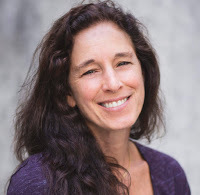 C. S. Lakin is an editor, award-winning blogger, and author of twenty novels and the Writer’s Toolbox series of instructional books for novelists. She edits and critiques more than 200 manuscripts a year and teaches workshops and boot camps to help writers craft masterful novels.
C. S. Lakin is an editor, award-winning blogger, and author of twenty novels and the Writer’s Toolbox series of instructional books for novelists. She edits and critiques more than 200 manuscripts a year and teaches workshops and boot camps to help writers craft masterful novels.

Slow Your Story to Move Readers Emotionally
by C.S. Lakin @CSLakin
We writers need to face this truth. Our #1 objective when writing fiction is to evoke a response from readers. Readers read to react. If our scenes don’t move our readers at all, we fail as writers. That’s a sobering fact.The reaction we’re intending will vary from moment to moment. But whether we want our readers to feel worry, fear, exhilaration, hope, or amusement, we need to learn how to elicit that response masterfully. It’s not easy to do.
I have critiqued and edited hundreds of manuscripts, and most of them fail when it comes to masterfully showing and evoking emotion. While there is no magic method or simple secret to move readers emotionally, there are some specific techniques writers can employ to achieve targeted emotional reactions.
This is one small element that impacts evoking specific emotions in your readers, but it's important:
Slow It Down
One sure way to lose a reader’s engagement is to rush. Characters, like real people, need time to react, to process what they experience. If dialogue and action move quickly without any insertion of character reaction, it’s likely the scene will fall flat emotionally.
However, even with “showing” emotion effectively in characters, if scenes fail to allow space for readers to react and process, they cheat the reader of the opportunity to respond fully to what they’re reading.
Let’s look at the end of Terri Blackstock’s opening scene from her thriller Predator. Krista’s sister has been missing for weeks, and a body’s been found. The tension builds as Krista arrives at the site and watches workers excavate the body.
Krista waited, willing back the numbness, certain she wouldn’t recognize the girl. As the first raindrops fell, a man in a medical examiner’s jacket took in a gurney, and Krista watched as they pulled the body from its shallow tomb. She saw the pink-striped shirt that Ella was wearing that last day. Blonde hair matted with blood and earth.
Her knees went weak, turned to rubber. She dropped and hit the ground. At once, a crowd of police surrounded her, asking if she was okay. She blinked and sat up, let them pull her back to her feet.
Ella!
She heard footsteps pounding the dirt.
“Aw, no! No! It can’t be her!” Her father’s voice, raspy and heart-wrenching, wailed out over the crowd. She wanted to go to him, comfort him, but it was as though her hands were bound to her sides and her legs wouldn’t move.
As they brought the girl closer, Krista saw the bloody, bruised face. Ella’s face.
The search was over. Her sister was dead.
Blackstock punches readers with emotion at the end of this scene by using techniques that help readers respond emotionally. She creates beats.
Create Beats
Beats or pauses in a scene can be created in many ways.When our characters pause and process, that provides a beat.Show tiny details they notice around them, which helps slow time in the scene. Krista blinks and sits up. It’s a small insertion that provides a beat.End chapters with action.That allows space for your reader to think about what just happened. Blackstock could have shown Krista weeping and wallowing in her thoughts as the gurney passed by, and that might have been a strong ending as well. But ending with the punch of action allows space for the reader to emotionally react.Use short words and short sentences. Use one-line paragraphs. “The search was over. Her sister was dead.” Short, to the point. Powerful.You can show an expression or gesture. Instead of saying “the news slapped her like a hand striking her face” you could say “Jill swallowed. Blinked. Reached a trembling hand to grasp the edge of the table.”
Want to move your readers by inserting beats? Try doing the following:When you read novels, look for the beats. Moments when the character stops to process. Moments when the author provides space for readers to react and process. Study the technique used and write it down.Look at one of your scenes in which something happens that’s important to your plot. A place where a beat is needed to give time for the character and reader to pause, react, and process what just happened. What kind of beat can you add here?Find places in the story or novel you’re writing to slow time. Have your character notice small details around her (a ticking clock, a smell or sound).Examine your scene endings. Do they pack a punch by ending with action? If not, consider how you might rewrite.Look for ways to punch moments home using short words, short phrases, stand-alone sentences—not only at scene endings but in key moments in your scene when you want your reader to react.
Evoking emotion from readers is a difficult skill, but learning to add beats will get you one step closer to becoming an “emotional master.”
Want to learn how to become a masterful wielder of emotion in your fiction? Enroll in Lakin’s new online video course, Emotional Mastery for Fiction Writers.

TWEETABLESSlow Your Story to Move Readers Emotionally - @CSLakin on @EdieMelson (Click to Tweet)
Tips to add emotional impact to your writing from @CSLakin on @EdieMelson (Click to Tweet)
 C. S. Lakin is an editor, award-winning blogger, and author of twenty novels and the Writer’s Toolbox series of instructional books for novelists. She edits and critiques more than 200 manuscripts a year and teaches workshops and boot camps to help writers craft masterful novels.
C. S. Lakin is an editor, award-winning blogger, and author of twenty novels and the Writer’s Toolbox series of instructional books for novelists. She edits and critiques more than 200 manuscripts a year and teaches workshops and boot camps to help writers craft masterful novels.
Published on September 05, 2019 22:00
September 4, 2019
Why You Should Support Other Author’s Events
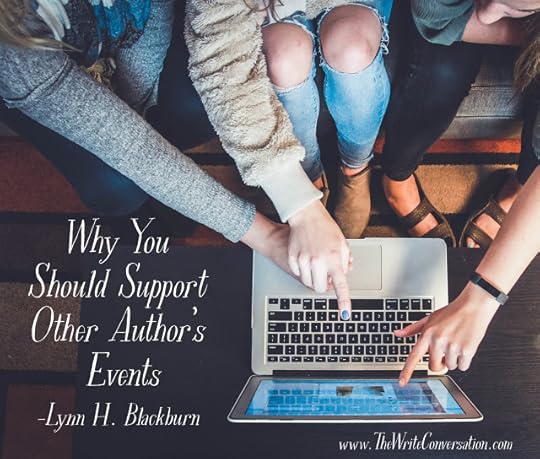
by Lynn H. Blackburn @LynnHBlackburn
During the first week of each month, my social media feeds are full of book launch news. The latest releases from both long-time favorite and new-to-me authors are available for purchase and the authors are promoting their books with Facebook live parties, Instagram takeovers, blog tours, book signings, giveaways, and more. If you’re deeply entrenched in the writing world, you may have started tuning it all out. “Oh great. Another book signing. Yay.” You may shoot a quick message of encouragement and then promptly forget about it. After all, it isn’t your book that’s releasing. And besides, those authors have a whole team of publicity and marketing people helping them. Why do they need your support?
Why indeed.
Let’s get the obvious reasons out of the way first shall we?
1. Most authors do not have a publicity machine behind them.They are scrambling for every sale and taking all kinds of risks to get their book in front of readers. Even if that author does have the support of a publicity and marketing team, they are still doing hours of promo work and pouring crazy amounts of energy into promoting their book. Please don’t assume that your support isn’t needed and appreciated.
2. It’s the nice thing to do. This may seem simplistic, but our world is harsh and there’s nothing wrong with choosing to be supportive for no other reason than that it is kind to do so.
3. If you’re already published, you can appreciate—better than anyone else—how much time and energy it has taken to reach this point.
4. If you’re pursuing publication then the “do unto others as you would have them do unto you” concept is huge here. If you don’t want to be alone at a book signing someday, maybe you should consider attending a few yourself.
But what if you aren’t feeling particularly altruistic? Or maybe you want to be kind, but you need a few more reasons to explain the importance of a quick trip to the bookstore to your significant other. Are there any other reasons?
Oh, yeah.
5. Digital Events: Facebook Live, Instagram Takeovers, Blog Tours, etc.—Let’s face it. These are usually the easiest. You don’t have to leave home and you can comment, interact, and share the event with your friends, all from your favorite chair while wearing your pajamas. If you’re already published, there’s a good chance the author will mention you as they’re interacting with their readers. It might look something like this—“Y’all, if you love Southern fiction you should check out my friend Lindsey Brackett’s books. They’re great.”
If you’re pursuing publication,this is a great learning opportunity. Seriously, if you aren’t published (and even if you are) you should be attending all the FB Live events you can. You’ll learn how the author interacts with their readers, what types of giveaways they do, what they talk about, and then you can make notes about what you’ll want to do when it’s your turn.
6. Live Events: Book Signings, Panel Discussions, Author Events—We’re all busy and it’s harder to be there in person. I get it. But there are some real perks to showing up. If you’re pursuing publication, book signings are a great way to meet the authors you’re aspiring to emulate. I am so awkward that I get nervous just introducing myself to people, but a few years ago I hopped in my car and drove to a local bookstore for a signing by Lynette Eason. She became my mentor and is now a dear friend. You never know what might happen, but you can be sure you’ll never find out if you don’t show up!
This is also a great way to learn. Do they have chocolate or cookies or donuts? Do they do a giveaway? Do they give a talk? How did they decorate their table? Don’t just attend the event. Take notes. If you’re already published, book events are a great way to introduce yourself—and your books—to the manager of the store, and to do so in a way that isn’t super awkward. (Really. I’m the queen of awkward).
Case in point: I recently attended the book signing of my friend Lindsey Brackett (who really does write amazing Southern fiction and you absolutely should read her books) at a local bookstore, Fiction Addiction. Because I’m a big chicken, I wasn’t even going to speak to the owner of the story, but our own Edie Melson introduced us.
Ten minutes later (this is NOT hyperbole), I was scheduled to be on a Mystery Author panel that conveniently enough will take place on Saturday, September 7th, just four days after my newest release ( One Final Breath ). The store owner also gave me some great tips for introducing myself to other bookstore owners around the country and there’s talk of a book signing for a group of local Christian authors next spring.
Could I have pulled that off on my own? Maybe. (Unlikely). But an interaction that would have felt forced and weird instead took place in a much more organic way and I’m hopeful it is just the first step toward a wonderful relationship.
So, now that I’ve convinced you of how important this is, let’s face a few facts.
Will you be able to participate in every event, show up for every book signing, and comment on every post? No.
Should you feel guilty about it when you can’t? No.
But I hope you’ll consider clicking the "going" button, liking and commenting on posts, and sharing your bookish enthusiasm for another author with your friends and followers.
And when you can, make the effort to show up in person!Who knows what will happen?
Grace and peace,

(I really will be on a Mystery Panel at Fiction Addiction in Greenville, SC on Sept. 7that 2PM and would love to see you!)
TWEETABLES
Why You Should Support Other Author’s Events - @LynnHBlackburn on @EdieMelson (Click to Tweet)
6 Reasons to Support Your Fellow Authors from @LynnHBlackburn on @EdieMelson (Click to Tweet)
 Lynn H. Blackburn loves writing suspense because her childhood fantasy was to become a spy—but her grown-up reality is that she's a huge chicken and would have been caught on her first mission. She prefers to live vicariously through her characters and loves putting them into all kinds of terrifying situations—while she's sitting at home safe and sound in her pajamas!
Lynn H. Blackburn loves writing suspense because her childhood fantasy was to become a spy—but her grown-up reality is that she's a huge chicken and would have been caught on her first mission. She prefers to live vicariously through her characters and loves putting them into all kinds of terrifying situations—while she's sitting at home safe and sound in her pajamas! Her Dive Team Investigations series kicked off in 2018 with Beneath the Surface and In Too Deep (A SIBA Okra pick and Selah Award Finalist). The 3rd book in the series, One Final Breath, releases in September 2019. She is also the author of Hidden Legacyand Covert Justice,which won the 2016 Carol Award for Short Novel and the 2016 Selah Award for Mystery and Suspense. Lynn lives in South Carolina with her true love and their three children. You can follow her real life happily ever after at www.LynnHBlackburn.com and on Facebook, Twitter, Pinterest, and Instagram.
Published on September 04, 2019 22:00
September 3, 2019
Perspective Changes Everything—Tips for Writing Description based on Character
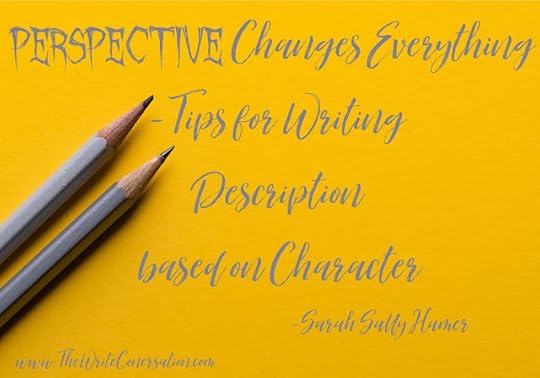
by Sarah Sally Hamer @SarahSallyHamer
Writers use words to paint pictures. Unlike screenwriters and the cadre of directors, set and costume designers, and cinematographers who use an entirely different set of tools, we writers have to describe the windy hillside, the absolute cold of space, the golden plains of grain. But it’s not quite that easy. We also have to tell the story through our characters and their feelings. Each character is unique. Or should be! So their perspective should reflect that uniqueness. My two characters from my previous blogs about Deep Point of View are going to help me explain. Belinda is a soon-to-be ex-wife, walking down the hall of the courthouse. Susan is at the visitation for her young daughter’s funeral.
Use their deep point of view.Belinda is angry. Actually, “angry” doesn’t even begin to describe what she feels. She’s a volcano with a magma chamber five miles deep, just waiting to explode and melt her ex-husband and his new girlfriend into unidentifiable crisps.
So, when we describe the hallway of the courthouse, we won’t talk about the polished wooden benches and the swoosh of doors shutting behind her. Instead, Belinda’s perception will be skewed by her emotion. The hallway will close in on her, with the echo of each step taking her more deeply into a prison she can’t escape from. The doors will seem like open mouths, disgorging or absorbing people whose chatter doesn’t make any sense. Even if someone smiled at her, she’d probably see it as a grimace with garish teeth. When she locates her husband, his arm around that much-younger-than-him floozy, Belinda’s vision sharpens and every painted fingernail and bleached hair, and especially that tight skirt, comes into perfect view.
Nothing else matters. Not the other people standing around, not the clock on the wall, not the brand-new blue carpet. ONLY the things she needs to see will be seen and described. And they will be defined by how she feels.
Everything around Susan, the grieving mother, droops and weeps, from the draperies to the plants. The fragrance of the flowers makes her stomach churn. The sun might be shining but the stained glass windows would reflect it as deep, frightening shadows. Her narrow perception, and therefore the description the author includes, won’t include the faces of the people in the receiving line. She may see their hands as she shakes them, but she’ll stand stiffly, not allowing anyone to hug her, so she doesn’t break down. She clings to her daughter’s favorite bear, her one solace, loving the torn ear and the missing eye, remembering how beloved it was.
The things I’m describing are just things. Because Belinda is an attorney, she’s walked down that courthouse hallway thousands of times, only noticing what she needed to. The bear Susan is holding was a nuisance to her when Chelsea spit up all over it and it needed to be washed or the day Chelsea left it at the toy store and they had to call a manager to unlock the door because she couldn’t sleep without it.
Readers will not only pay attention to the description, they’ll feel it too.
Are these important details? Only if you want to really show your character’s perspective, which delineates everything they see, hear, taste, touch, or smell. A happy character sees the world in a happy way. But an unhappy character sees nothing beyond what their emotion allows them.
How about your characters? How do they see their world? How does that perspective change as they do?
TWEETABLEPerspective Changes Everything—Tips for #Writing Description based on Character - @SarahSallyHamer on @EdieMelson (Click to Tweet)
Tips for #writing description using deep POV - @SarahSallyHamer on @EdieMelson (Click to Tweet)
 Sarah (Sally) Hamer is a lover of books, a teacher of writers, and a believer in a good story. Most of all, she is eternally fascinated by people and how they 'tick'. She’s passionate about helping people tell their own stories, whether through fiction or through memoir. Writing in many genres - mystery, science fiction, fantasy, romance, medieval history, non-fiction – she has won awards at both local and national levels, including two Golden Heart finals.
Sarah (Sally) Hamer is a lover of books, a teacher of writers, and a believer in a good story. Most of all, she is eternally fascinated by people and how they 'tick'. She’s passionate about helping people tell their own stories, whether through fiction or through memoir. Writing in many genres - mystery, science fiction, fantasy, romance, medieval history, non-fiction – she has won awards at both local and national levels, including two Golden Heart finals.A teacher of memoir, beginning and advanced creative fiction writing, and screenwriting at Louisiana State University in Shreveport for over sixteen years, she also teaches online for Margie Lawson at www.margielawson.com. Sally is a free-lance editor and book coach at Touch Not the Cat Books, with many of her students and clients becoming successful, award-winning authors.
You can find her at hamerse@bellsouth.netor www.sallyhamer.blogspot.com
I wish to express gratitude to the giants whose shoulders I stand on and who taught me so much about the writing craft. I would list every one, if it were only possible.
Published on September 03, 2019 22:00
September 2, 2019
Tips for Fiction Writers: Which Character Has the Most to Lose?
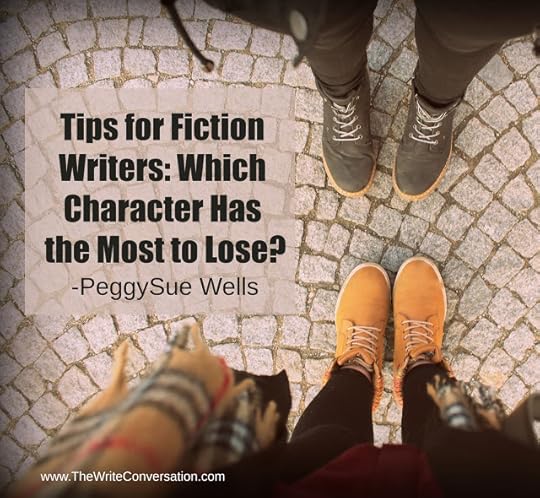
by PeggySue Wells @PeggySueWells
Rewrite your chapter from the viewpoint of another character.
The assignment was a consumer of valuable time but that’s what my mentor required.
Enrolled in a mentorship program, each fresh chapter of my novel went to award-winning author, DiAnn Mills, who helped improve my skills.
I opened a fresh Word file on my laptop, MacBeth, pulled the weakest chapter from the work in progress and pasted it there. Then I went about getting through this requirement so I could move onto the next – hopefully more important—step. Of course, something magical happened as I took the chapter out of the hero’s view. Most of the story is seen from his eyes anyway. This scene only had two characters in it—the good guy and the not good guy. This was the point of no return, the moment when the bad guy made his move against our protagonist. From the good guy’s POV, he just had to be there and get got. The passive victim.
But the villain became three dimensional as I scoped out the landscape from his calculating eye. Our friendly friends and neighbors were suddenly dangerous if they noticed him. Every movement was orchestrated to get the dirty deed done without a witness. To commit the witnessless crime.
Okay, fine. So maybe this assignment wasn’t a waste of time. Maybe this chapter became one of my favorites. Among the many other lessons that improved my fiction skills, I learned that when a chapter lacks that page-turning depth, write it from the view of another character.
Key lesson: write each chapter from the point of view of the character who has the most to lose.
I may have learned plenty of other excellent writing skills that moved me to the next level in my abilities. Certainly, there was an added delight in writing chapters and developing story lines when DiAnn was going to read through it, provide worthy feedback designed to encourage and inspire me, and we would spend that glorious hour on the phone talking about one of my favorite subjects—grandchildren. Kidding. Writing, of course.
About the novel? I finished it—all 420 pages. And I am writing the sequel with two other stories in the series outlined. If I get stuck, I can apply that time-consuming exercise and write the chapter from the viewpoint of another character. The one with the most to lose.
TWEETABLE
Tips for Fiction Writers: Which Character Has the Most to Lose? @PeggySueWells on @EdieMelson (Click to Tweet)
 Tropical island votary and history buff, PeggySue Wells parasails, skydives, snorkels, scuba dives, and has taken (but not passed) pilot training. Writing from the 100-Acre wood in Indiana, Wells is the bestselling author of twenty-eight books including The Slave Across the Street, Slavery in the Land of the Free, Bonding With Your Child Through Boundaries, Homeless for the Holidays, and Chasing Sunrise. Optimistic dream-driver, PeggySue is named for the Buddy Holly song with the great drumbeat. At school author visits, she teaches students the secrets to writing, and speaks at events and conferences. Connect with her at www.PeggySueWells.com, on Facebook at PeggySue Wells, and Twitter @PeggySueWells.
Tropical island votary and history buff, PeggySue Wells parasails, skydives, snorkels, scuba dives, and has taken (but not passed) pilot training. Writing from the 100-Acre wood in Indiana, Wells is the bestselling author of twenty-eight books including The Slave Across the Street, Slavery in the Land of the Free, Bonding With Your Child Through Boundaries, Homeless for the Holidays, and Chasing Sunrise. Optimistic dream-driver, PeggySue is named for the Buddy Holly song with the great drumbeat. At school author visits, she teaches students the secrets to writing, and speaks at events and conferences. Connect with her at www.PeggySueWells.com, on Facebook at PeggySue Wells, and Twitter @PeggySueWells.
Published on September 02, 2019 22:00



